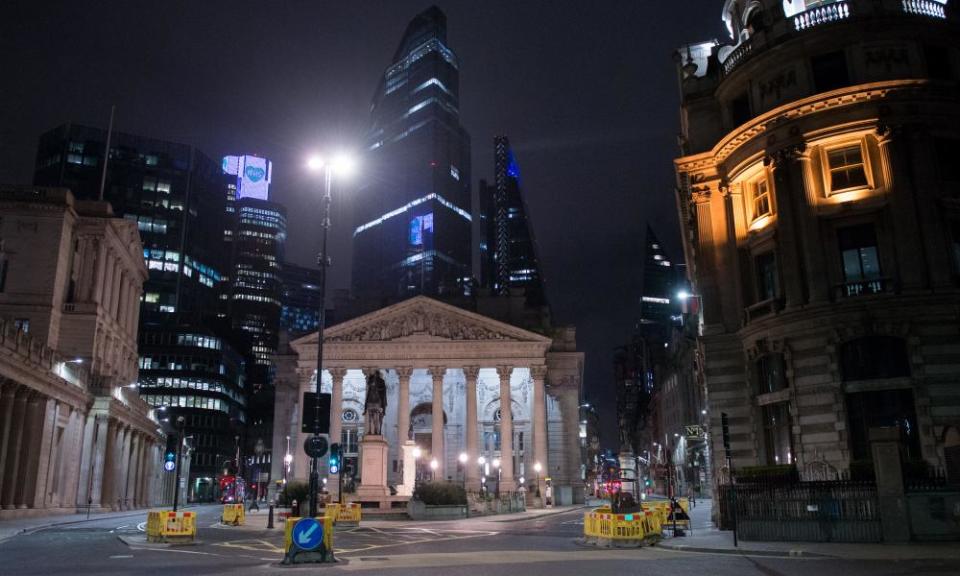FTSE shrugs off dire UK data as markets sense easing of Covid-19 crisis

Investors were cheered on Monday by signs that the severity of the coronavirus crisis may be easing, helping the FTSE 100 to shrug off dire UK economic data.
The index of blue-chip shares climbed more than 3% to 5,582, raising hopes of a more sustained recovery after five consecutive weekly falls, with positive sentiment in the UK mirrored on Wall Street and other European indices such as Germany’s Dax.
The market gains followed reports that some European governments were weighing up whether to lift the most stringent lockdown restrictions.
Analysts at the online trading firm IG said this had led to a buying spree, despite the likelihood that the second quarter of the year would be characterised by plunging economic indicators.
“This might seem odd when we can expect weeks of poor data, but the simple fact is that talk of reopening economies is now widespread, and the data from Italy, Spain, Belgium and even New York is providing hope that some countries have passed the peak and others are nearing it,” said Chris Beauchamp, IG’s chief market analyst.
While the FTSE gained 3%, the Dow Jones was up more than 1,000 points or nearly 6% by lunchtime on Wall Street. Germany’s Dax closed up nearly 6%.
However, New York-based foreign exchange company OANDA warned that optimism among stock investors could fizzle out, once attention returns to the likelihood of lasting consumer caution.
“The rally in equities will likely be short-lived as investors will soon have to become sceptical of the great recovery and focus on the financial stress that will happen after several key parts of the economy will not come back to life for many months,” said senior market analyst Edward Moya.
“Travel, entertainment, and physical retail (excluding food and drug) will not see any normalcy until much later in the year. I don’t see people going to a Broadway show, baseball game or trying to book a vacation this summer.”
In the UK, the FTSE’s gain was all the more remarkable given dismal figuresfrom the construction and automotive sectors, which have been ravaged by shutdowns caused by Covid-19.
Construction suffered the sharpest fall in activity since the financial crisis during March, a survey showed on Monday, despite the industry being slower than other industries to shut down operations due to the coronavirus.
The figures from financial data provider IHS Markit and the Chartered Institute of Procurement and Supply (Cips) also confirmed data last week that showed the British private sector as a whole is contracting at its fastest rate in more than 20 years.
The construction Purchasing Managers’ Index tumbled to 39.3 in March from 52.6 in February, with anything below 50 representing a decline in activity. The drop took the index to its lowest level since April 2009 and well below economists’ average forecast of 44.0.
The 13-point monthly fall was the largest since the survey began in 1997, and the index could worsen still.
“The sector is stuck in quicksand and sinking further,” Duncan Brock, group director at Cips, said.
Some construction projects have continued, with workers spaced two metres apart, allowing construction to escape the complete shutdowns seen elsewhere, such as in the hospitality industry.
Gareth Belsham, director of property consultancy Naismiths, said the continuation of some activity, coupled with the sector’s experience of recovering from economic turmoil, should give cause for optimism.
“Few sectors have more bitter, regular experience of enduring sharp falls in confidence than construction.
“Battle scars in of themselves will provide no protection from a simultaneous drop in both demand and supply. But the fact that the declines seen during the 2008 financial crisis were worse offers some comfort. Construction weathered that storm successfully, and will do so again.”
The automotive sector has been particularly hard hit over the past three weeks. Every major car manufacturer in the UK has shut down its factories and the industry trade body revealed on Monday that demand for new vehicles has also plunged, spelling more trouble ahead for the sector.
Sales of new cars in March fell 44% compared with the same month last year to 254,684 units, while first-quarter sales were down by 31% to 483,557, the SMMT said.
The trade body also slashed its sales forecast for this year by 23% to 1.73m vehicles because of the impact of the coronavirus crisis.

 Yahoo Finance
Yahoo Finance 